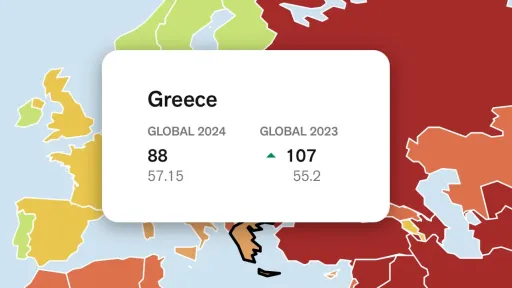Press freedom: Greece drops to 89th place in RSF 2025 index — Lowest in the EU

Greece has once again slipped in the global press freedom rankings, falling to 89th place in the 2025 World Press Freedom Index released by Reporters Without Borders (RSF). The country remains the lowest-ranked among European Union member states, trailing behind several nations in Africa and Latin America.
The report, published on World Press Freedom Day, paints a bleak picture of global media conditions. For the first time, RSF has classified the global situation for press freedom as “difficult.” The report notes that journalism is now considered in a “bad” state in half of the world’s countries, with the average score among all countries hitting a record low of 55 out of 100.
The RSF Index is based on five key indicators: journalist safety, social context, legal framework, political environment, and economic conditions. Of these, the most significant global decline was seen in the economic indicator, as media organizations worldwide face growing financial pressure, closures, and reduced independence.
Key Threats and Declines
While physical attacks on journalists remain the most visible violations, RSF emphasizes the growing threat of economic coercion — such as pressure from advertisers, cuts in public funding, or dependence on private financiers — as a more insidious force undermining press freedom. According to RSF, the economic indicator has now reached its lowest level since the index began.
In Greece, these trends have manifested in increasing economic and political constraints on journalism. Although specific incidents were not detailed in the report, the country’s continued decline is part of a broader deterioration observed since 2020.
Winners and Losers
The countries with the highest rankings in the 2025 index include Norway, Estonia, the Netherlands, Sweden, and Finland. Also in the top 10 are Denmark, Ireland, Portugal, Switzerland, and the Czech Republic.
At the bottom of the index are authoritarian and conflict-ridden nations: Eritrea, North Korea, China, Syria, Iran, Afghanistan, Turkmenistan, Vietnam, Nicaragua, and Russia.
Media closures have surged globally, with 34 countries experiencing widespread shutdowns of outlets. Among them are Nicaragua (172nd), Belarus (166th), Iran (176th), Myanmar (169th), Sudan (156th), Azerbaijan (167th), and Afghanistan (175th).
Even countries with traditionally strong press freedom, such as New Zealand (16th) and South Africa (27th), are struggling with financial sustainability and independence.
Dire Conditions in Gaza, Struggles in the U.S.
In Gaza, the situation is described as “desperate.” RSF reports that Israel’s military blockade of the Gaza Strip has lasted over 18 months and nearly 200 journalists have been killed during the conflict.
In the United States, media freedom continues to deteriorate, with the country ranked 57th in 2025 — down two places from last year. RSF notes a sharp decline in the “social context” indicator, dropping 28 positions, amid growing hostility towards journalists.
The second presidency of Donald Trump has accelerated these trends. RSF reports that funding has been cut for major public media institutions like the U.S. Agency for Global Media (USAGM), affecting outlets such as Voice of America and Radio Free Europe/Radio Liberty. The defunding of USAID's media initiatives has also left hundreds of news organizations worldwide in financial crisis.
A “Coordinated Attack”
Marty Baron, former executive editor of The Washington Post, warned of a “coordinated attack” on press freedom in the United States. In an interview with Gazeta Wyborcza, he cited closures of state-funded broadcasters and increasing political control over White House press access.
“Donald Trump now decides who gets to ask him questions. He dictates language and restricts topics. Even as a private citizen, he pressures the media through lawsuits,” Baron said.
The 2025 RSF report concludes with a call for international solidarity and renewed efforts to protect journalism. “We must double down in defending journalists who face retaliation,” said David Walmsley, editor-in-chief of The Globe and Mail. He urged the global media community not to forget figures like Jimmy Lai, imprisoned in isolation in Hong Kong.







